Studying the intersection of obesity and pancreatic cancer to unlock early warning signs
Ohio State scientist’s research seeks to improve pancreatic cancer outcomes and reverse its companion ‘wasting disease,’ cachexia.
As one of only a few scientists in the United States to study how fat, muscle, obesity and exercise affect pancreatic cancer, the research of Zobeida Cruz-Monserrate, PhD, is detailed and complex.
Each week, she launches her lab team meetings with a lively discussion featuring an inspirational quote, like: “Focus on the journey and not the destination.”
Dr. Cruz-Monserrate, a cancer researcher at the The Ohio State University Comprehensive Cancer Center – Arthur G. James Cancer Hospital and Richard J. Solove Research Institute (OSUCCC – James) and associate professor of Internal Medicine’s Division of Gastroenterology, Hepatology and Nutrition, knows better than anyone these conversations bring positive energy to scientific research that can otherwise be arduous.
She’s a leading researcher in how obesity is a risk factor for pancreatic diseases and cachexia — a metabolic wasting disorder that affects muscle and fat tissue. There are no prevention strategies for pancreatic cancer or therapy to treat cachexia. The syndrome makes patients develop rapid weight loss and feel generally weak, impacting their ability to finish treatment and carry out normal daily functions.
Dr. Cruz-Monserrate knows that improving outcomes for patients with pancreatic cancer means finding ways to counteract the obesity-associated risk and to reverse cachexia.
Her colleague, Christopher Coss, PhD, assistant professor in pharmaceutics and pharmacology, explains that most cancer research emphasizes understanding and treating the cancer cells. Less is known about how cancer affects the rest of a patient’s body system. “When we talk about cancer to clinicians or scientists, it’s all about the tumor, he says. “But, you talk to the patients, and they’re like, ‘What about me?’”
Dr. Cruz-Monserrate’s work keeps the whole patient in mind, specifically how patients’ bodies interact with pancreatic diseases.
Her goal is ambitious. The need is massive.
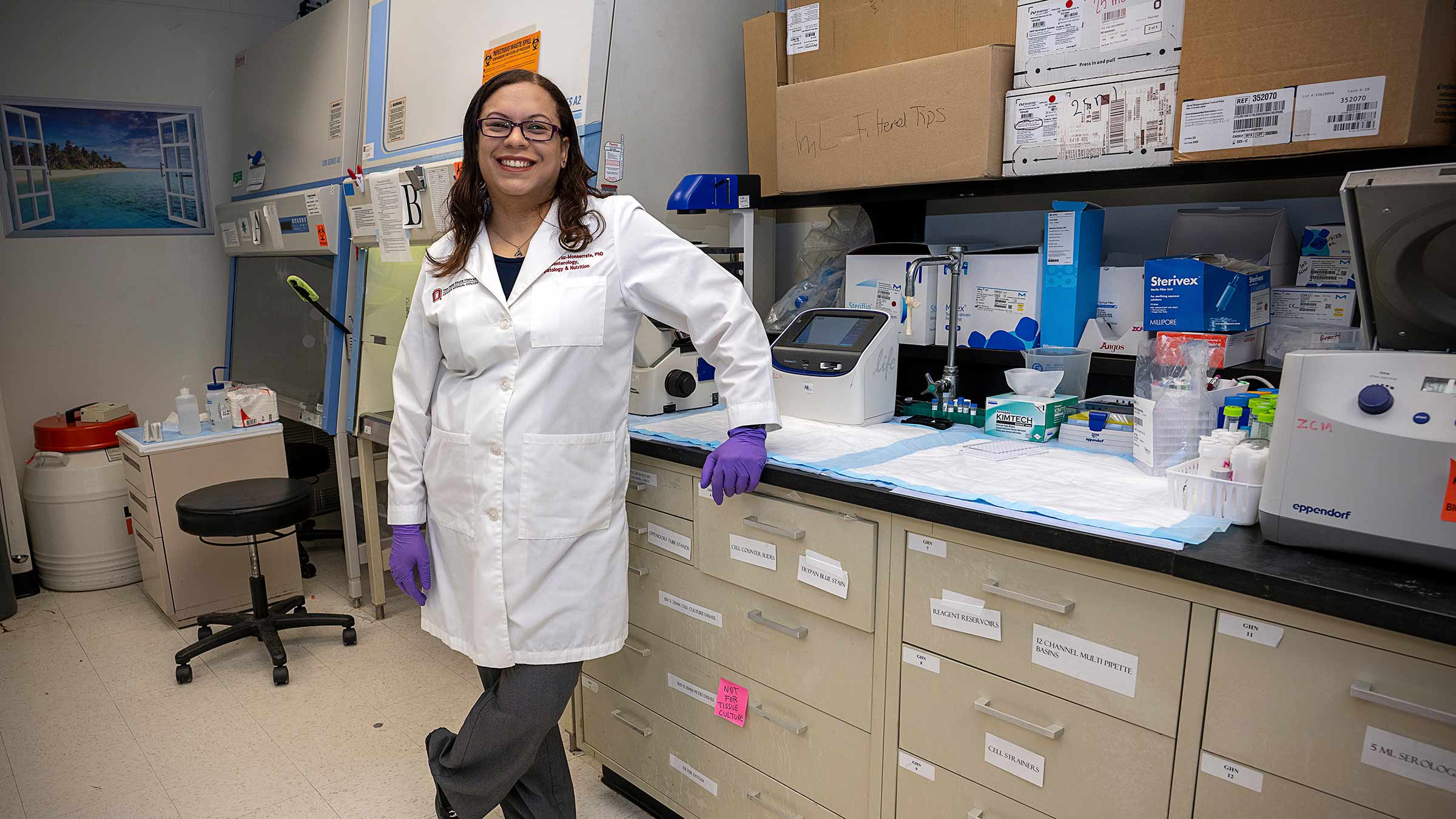
Pancreatic cancer: a devastating diagnosis
Pancreatic cancer affects about 64,000 Americans each year. It represents 3% of all cancers but about 7% of cancer deaths.
One of its most common symptoms is significant weight loss. Physicians will often see patients who report losing weight despite overeating, especially after the holidays. When closer inspection reveals pancreatic cancer, it’s a devastating prognosis.
That stark reality keeps Dr. Cruz-Monserrate and her lab team focused on the challenge of advancing pancreatic cancer research. “I’m just angry at the fact that it’s such a devastating disease — that you can get the diagnosis today after feeling OK days before.”
Pancreatic diseases are complex and poorly understood. Little is known about the biomarkers — biological indicators of disease — that would help physicians better detect pancreatic cancer and pancreatitis. Unlocking early warning signs could help doctors prevent and treat them.
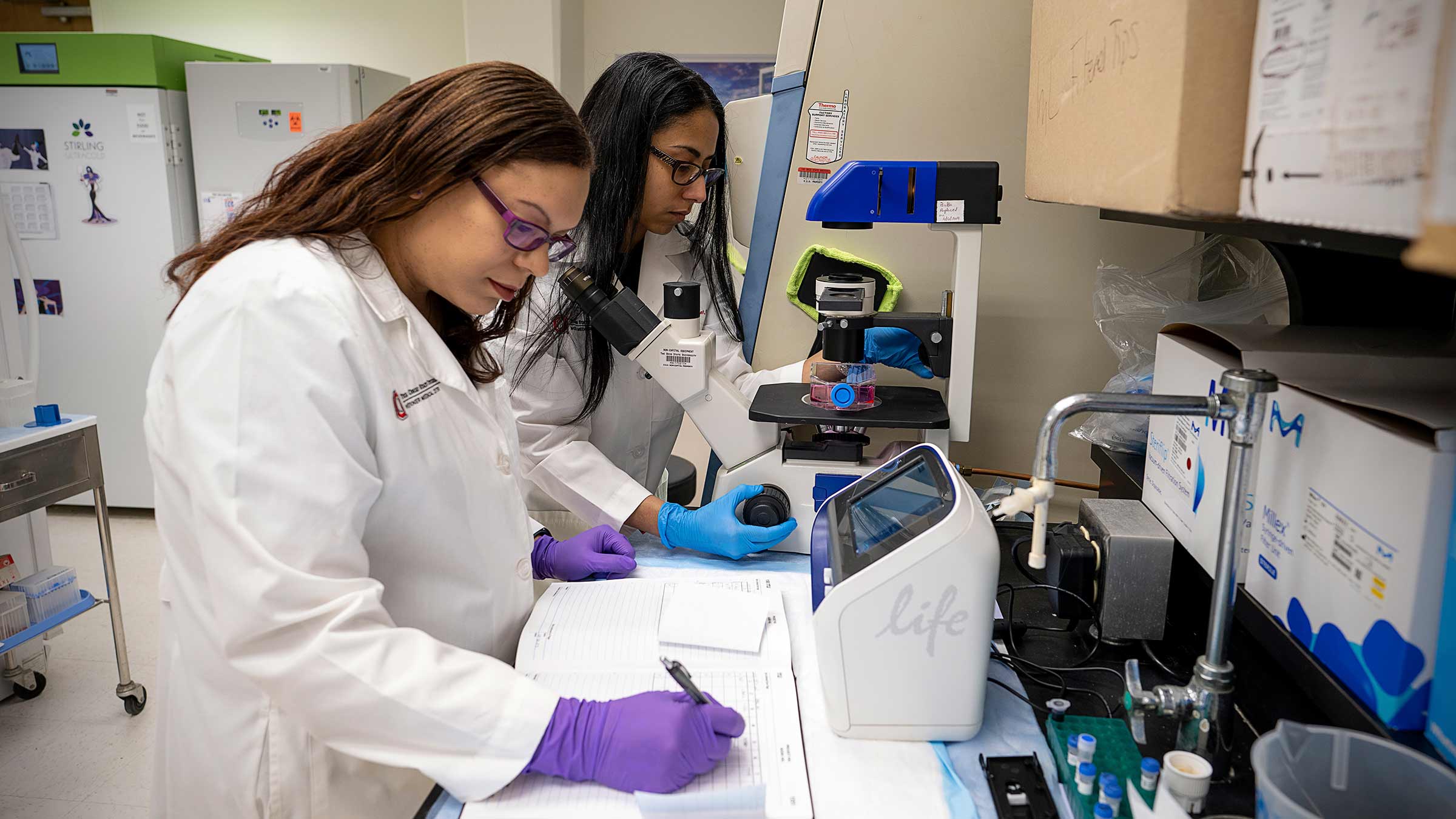
Understanding the obesity connection to pancreatic diseases
The Cruz-Monserrate Lab puts a special focus on understanding the nature of pancreatic diseases, especially those associated with obesity like pancreatitis and pancreatic ductal adenocarcinoma (PDAC) — one of the deadliest types of pancreatic cancers.
PDAC has a five-year survival rate of only 13%. Chemotherapy is offered to all patients, but only 20% of patients are eligible for surgery. Most patients are diagnosed at advanced stages, often once cachexia has already occurred. This makes understanding the cross-talk between fat tissue, muscle, the immune system and pancreatic cancer a vital piece of the puzzle to advance pancreatic cancer outcomes, and the focus of Dr. Cruz-Monserrate’s research, including:
- Novel strategies for the detection, prevention and treatment of PDAC and pancreatitis. The team’s research has uncovered drivers related to how these diseases start. She’s identified early biomarkers of PDAC, along with novel imaging probes that can detect and treat early lesions on the pancreas in animal models of the disease.
- Preventing obesity-associated tumor growth. Obesity causes an increased risk of cancer development — especially PDAC. Understanding why is critical as obesity rates grow worldwide. The lab uses a mouse model of diet-induced obesity to study some of the mechanisms that link obesity and PDAC.
- How exercise and nutritional therapies help prevent tumor growth. Decreased physical activity increases the risk of PDAC. Understanding whether increasing activity and changing nutrition could reduce inflammation and potentially prevent PDAC remains unclear. Understanding this is key to reversing cachexia.
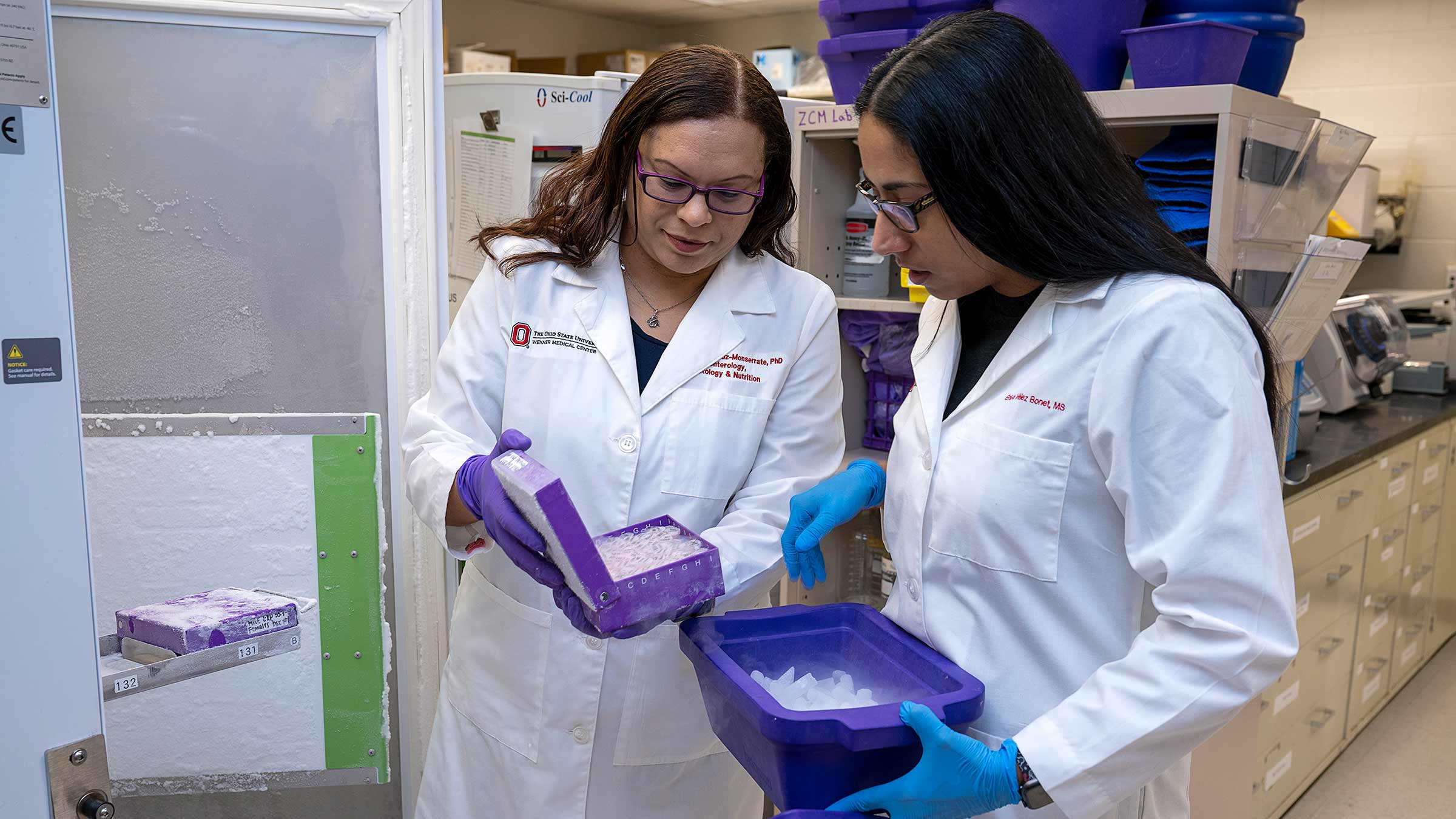
Ohio State’s rich bank of tissues accelerates research
The research relies on vital access to a rich repository of tissues collected over more than a decade at Ohio State. Dr. Cruz-Monserrate champions and maintains the repository bank, which allows researchers to translate study results from the lab to clinical models. Ohio State has one of the few pancreatic disease repository banks worldwide intended to study metabolic disorders like obesity and cachexia.
Phil Hart, MD, director of clinical research and a professor of Internal Medicine, says, “When the samples are collected, handled and stored, it's more systematic and rigorous because you know Dr. Cruz-Monserrate maintains it. The amount of confidence you have in those samples and the resulting analysis is much higher.”
Supplying the repository bank is no small feat. Dr. Cruz-Monserrate helped champion new processes to collect patient tissue for research. For example, during pancreatic resection surgery to remove part of the pancreas, the protocol for some clinicians at Ohio State is to collect a small sample of the tumor, fat and muscle, with the patients’ permission. This takes the effort of many in a rich collaborative environment among Ohio State clinicians and researchers.
Early life of a future cancer researcher
While Dr. Cruz-Monserrate describes herself as a scientist by nature, gaining the skills to become a researcher wasn’t a given in her early years in Puerto Rico. Her mother worked as head nurse in an emergency department, while her father delivered newspapers to pay for her private school education. Together, they emphasized the power of education and hard work. “I was very curious as a kid, always asking a thousand questions and driving my parents and teachers crazy,” she says.
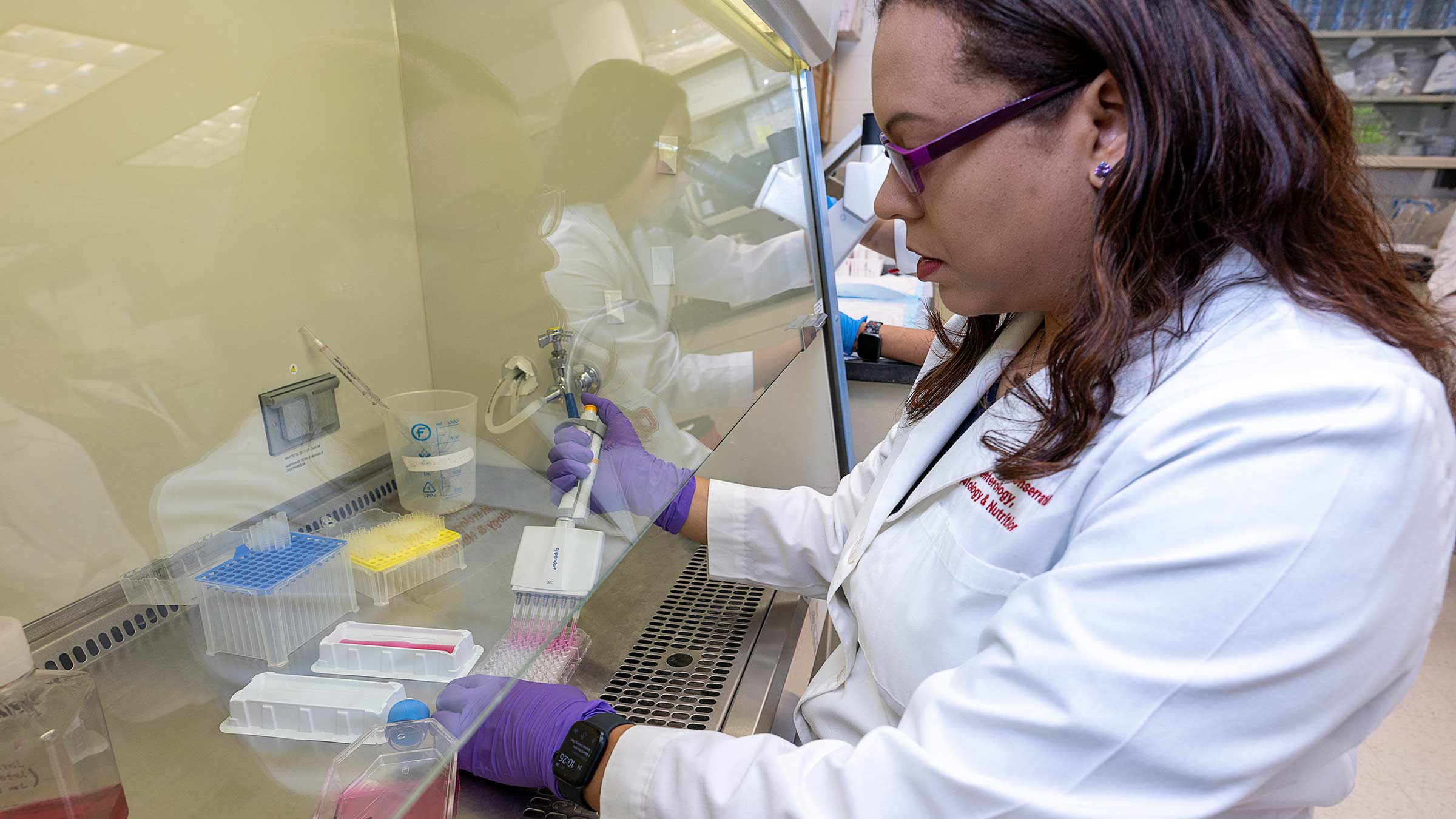
What her parents afforded her is never far from her mind. “Now, as an underrepresented minority and woman of color in biomedical research, I’ve achieved the dream of having an independent and collaborative career,” she says. She also knows that her career path will pave the way for many.
The promise of team science at The James
Researchers in the Cruz-Monserrate Lab work closely with physician-scientists to bring research from the lab to patients. That sense of collaboration is part of a culture of team science at The James, leveraging expertise from multiple fields to solve problems. “One of the things I’ve seen in The James is a very collaborative environment where, for example, we might need the same set of samples, so maybe we can design our experiments to answer both of our questions of interest,” Dr. Cruz-Monserrate says.
Somashekar Krishna, MD, MPH, a gastroenterologist and clinical professor of Internal Medicine, credits Dr. Cruz-Monserrate’s support and advice for his successful application for an R01 grant from the National Institutes of Health, one not commonly awarded to endoscopists. Dr. Cruz-Monserrate, who had already received this type of grant in the past and is co-investigator in others, guided Dr. Krishna through multiple attempts of the complex application. “If I have a problem, I text her, and she gives me a solution right away, even though she’s so busy,” Dr. Krishna says.
Dr. Cruz-Monserrate knows training the next generation of scientists is key to advancing pancreatic cancer and cachexia research. She considers supporting each of them in their career journeys among her highest callings.
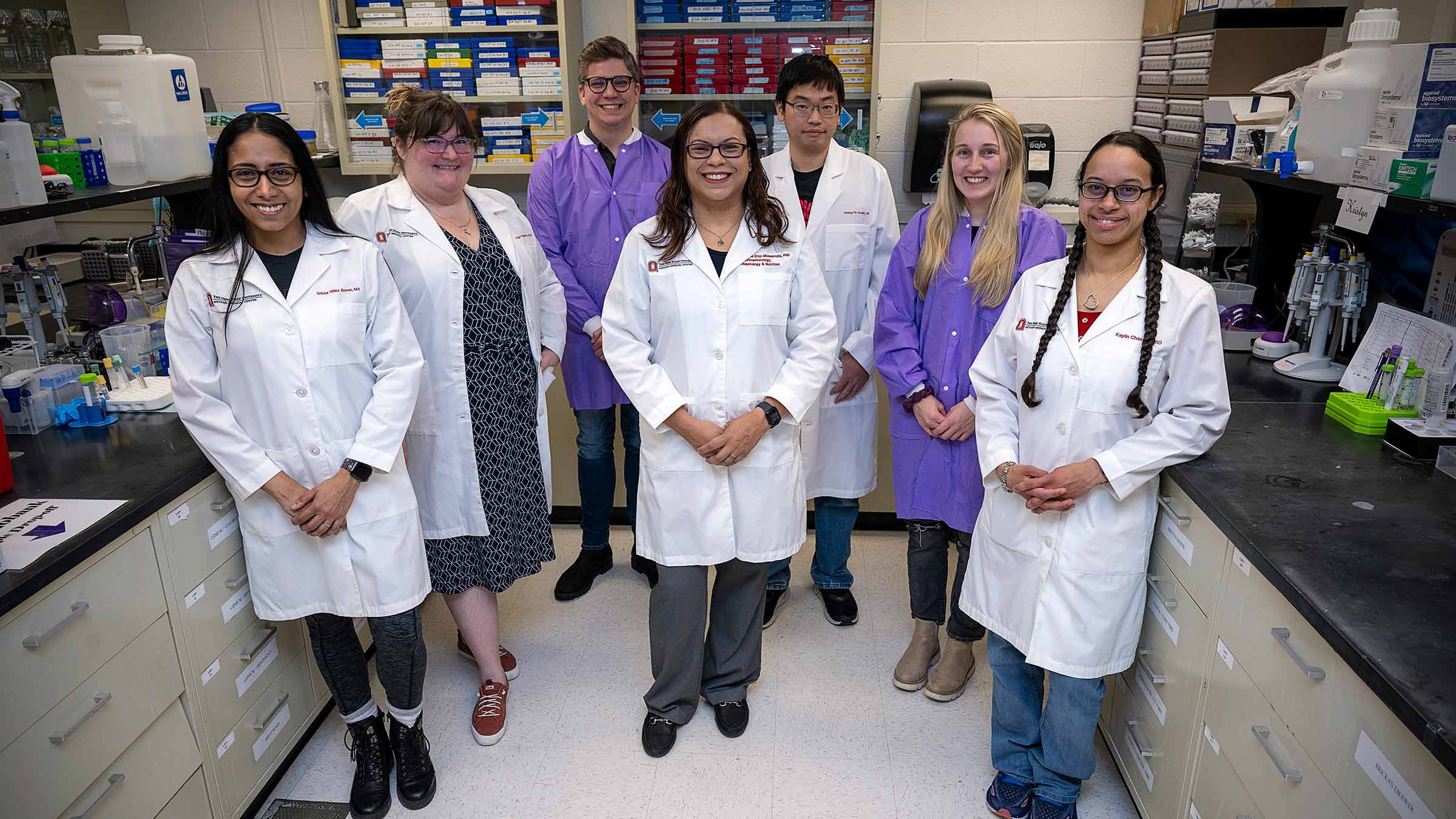
The Cruz-Monserrate Lab is a microcosm of team science, with lab members bringing diverse research backgrounds from physiology and nutrition and even animal sciences.
Lab mentees reap the benefits of her dedication to mentorship. “She’ll do anything in her power to give us all the opportunities and resources we need to reach our goals,” says Valentina Pita-Grisanti, PhD, a graduate student who spent five years in the Cruz-Monserrate Lab.
Kristyn Gumpper-Fedus, PhD, a senior postdoctoral scholar in the lab, says Dr. Cruz-Monserrate demonstrates research excellence by example. “The work of answering many research questions around pancreatic cancer is massive. Dr. Cruz-Monserrate excels at breaking problems down into small parts so that every study answers one piece of the puzzle. It’s a way of thinking that motivates her mentees in whatever field they go on to study.”
For Dr. Cruz-Monserrate, leadership is simply another way to care for people. “I care about training people as passionate as I am.”
Incremental steps with eyes on the end game
Dr. Cruz-Monserrate’s ultimate goal for her research is to benefit the victims of pancreatic disease, who so desperately need a better chance at survival. On long days when the research feels insurmountable, she turns back to her favorite mantra for herself and her trainees, reminding her to focus on the journey. “We get too much into our goals and forget that the process to get there really matters. There’s lots to learn along the way that shapes how we live and react when we finally accomplish a goal.”

Accurate, early cancer diagnosis matters
The James Cancer Diagnostic Center gives patients direct, expedited access to diagnostic testing and consultation with Ohio State cancer experts.
Schedule an appointment today




